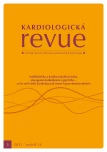Antidiabetic drugs and cardiovascular risk – before and now
Authors:
M. Haluzík
; M. Urbanová; P. Trachta
Published in:
Kardiol Rev Int Med 2012, 14(3): 149-152
Category:
Overview
Cardiovascular complications are the major cause of morbidity and mortality of patients with type 2 diabetes mellitus. This is why the major aim of the complex treatment of these patients is to decrease their total cardiovascular risk. This view point plays an important role in assessing the effects of antidiabetic drugs in recent years. Long term studies have suggested that tight diabetes compensation early after diagnosis can decrease cardiovascular risk. Much less is known about the effects of respective antidiabetic drugs on cardiovascular complications. From the classical antidiabetic drugs portfolio only metformin and in part pioglitazone has confirmed cardioprotective effects. Out of recently introduced antidiabetic therapies experimental and smaller clinical studies suggest a very good potential for incretin-based therapies i.e. gliptins or glucagon-like peptide 1 agonists. The effect of novel antidiabetic therapies on cardiovascular complications which is now being intensively explored within long-term studies will in near future undoubtedly become one of the leading decisive factors in the selection of antidiabetic treatment.
Keywords:
type 2 diabetes mellitus – antidiabetic treatment – cardiovascular complications – diabetes compensation
Sources
(kompletní seznam je k dispozici u autora):
1. Rosolova H, Blaha V, Ceska R et al. The effect of treatment with fenofibrate on the risk profile of patients with metabolic syndrome and mixed dyslipidemia treated on an outpatient basis. Vnitr Lek 2007; 53 : 339–346.
2. Svačina S, Owen K. Syndrom inzulínové rezistence. Praha: Triton 2003.
3. Haffner SM. Insulin resistance, inflammation, and the prediabetic state. Am J Cardiol 2003; 92 : 18J–26J.
4. Holman RR, Paul SK, Bethel MA et al. 10-year follow-up of intensive glucose control in type 2 diabetes. N Engl J Med 2008; 359 : 1577–1589.
5. Effect of intensive blood-glucose control with metformin on complications in overweight patients with type 2 diabetes (UKPDS 34). UK Prospective Diabetes Study (UKPDS) Group. Lancet 1998; 352 : 854–865.
6. Skyler JS, Bergenstal R, Bonow RO et al. American DiabetesAssociation; American College of Cardiology Foundation; American Heart Association. Intensive glycemic control and the prevention of cardiovascular events: implications of the ACCORD, ADVANCE, and VA Diabetes Trials: a position statement of the American Diabetes Association and a Scientific Statement of the American College of Cardiology Foundation and the American Heart Association. J Am Coll Cardiol 2009; 53 : 298–304.
7. Gerstein HC, Miller ME, Byington RP et al. Action to Control Cardiovascular Risk in Diabetes Study Group. Effects of intensive glucose lowering in type 2 diabetes. N Engl J Med 2008; 358 : 2545–2559.
8. Control Group. Turnbull FM, Abraira C, Anderson RJ et al. Intensive glucose control and macrovascular outcomes in type 2 diabetes. Diabetologia 2009; 52 : 2288–2298.
9. Nissen SE, Wolski K. Effect of rosiglitazone on the risk of myocardial infarction and death from cardiovascular causes. New Engl J Med 2007; 356 : 2457–2471.
10. Inzucchi SE, Bergenstal RM, Buse JB et al. American Diabetes Association(ADA); European Association for the Study of Diabetes (EASD). Management of Hyperglycemia in Type 2 Diabetes: A Patient-Centered Approach: Position Statement of the American Diabetes Association (ADA) and the European Association for the Study of Diabetes (EASD). Diabetes Care 2012; 35 : 1364–1379.
11. Schwartz TB, Meinert CL. The UGDP controversy: thirty-four years of contentious ambiguity laid to rest. Perspect Bio Med 2004; 47 : 564–574.
12. Nissen SE, Nicholls SJ, Wolski K et al. PERISCOPE Investigators. Comparison of pioglitazone vs glimepiride on progression of coronary atherosclerosis in patients with type 2 diabetes: the PERISCOPE randomized controlled trial. JAMA 2008; 299 : 1561–1573.
13. Haluzík M, Svačina Š. Inkretinová léčba diabetu. Praha: Mladá Fronta 2010.
14. ORIGIN Trial Investigators, Gerstein HC, Bosch J, Dagenais GR, et al. Basal Insulin and Cardiovascular and Other Outcomes in Dysglycemia. N Engl J Med 2012; 367 : 319–328.
Labels
Paediatric cardiology Internal medicine Cardiac surgery CardiologyArticle was published in
Cardiology Review

2012 Issue 3
-
All articles in this issue
- Antidiabetic drugs and cardiovascular risk – before and now
- Importance of determining apolipoproteins B and A-1 in clinical practice
- Residual vascular risk and the possibilities of therapy.
- Lipid-modifying therapies of tomorrow – what will they be like?
- Sudden death in cardiology
- Hypertriglyceridemia and cardiovascular risk
- Troponin as a prognostic risk factor in patients hospitalized for decompensation of chronic systolic heart failure
- The use of levosimendan: up-date 2012
- Ticagrelor in patients with acute coronary syndrome
-
Antithrombotics in the prevention of cerebrovascular accidents.
Part I – Significance of antiplatelet treatment - Renal denervation and its role in the treatment of resistant hypertension
- Mitral stenosis in the terminal phase – a case report
- Cardiology Review
- Journal archive
- Current issue
- About the journal
Most read in this issue
- Importance of determining apolipoproteins B and A-1 in clinical practice
- Ticagrelor in patients with acute coronary syndrome
- Hypertriglyceridemia and cardiovascular risk
- Troponin as a prognostic risk factor in patients hospitalized for decompensation of chronic systolic heart failure
